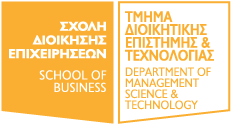Introduction to Economic Theory
ARACHOVAS CHARALAMPOS
Course Description
The teaching method that will be applied will include a simplified but at the same time scientific approach to the subjects through the provision of many examples. The instructor's extensive experience in the field and in-depth understanding of the subjects to be taught ensures his ability to simplify and adequately convey the information to the students. Weight will be given to the preparation of assignments and their presentation in the course. In this way, both the business and presentation skills of the students will be developed and the feedback between them will increase.
Learning Outcomes
The course is an introduction to the content and methodology of economic analysis and thinking. Emphasis is placed on the topics of microeconomic analysis, while an introduction to fundamental macroeconomic concepts.
The course examines the mechanisms of market designs and operations, the theories of demand and supply of goods, the organization and behavior of the business, the theories of production and costs, market forms (competition, monopoly, oligopoly) through specific examples. At the macroeconomic level, the concepts and ways of measuring product and income are analyzed as well as the issues of economic development and economic cycles.
Finally, the course is completed with approaches to special topics of the important philosophers of economic thought.
The purpose of the course is to understand the critical issues that Economics deals within both the micro and macro environment. More specifically, how economics agents make decisions will be analyzed. At the end, the lectures will be completed with the main contributions of the great philosophers of Economics.
The student will get to know the basic theories and practices and how to approach the current economic theory in order to deepen these concepts in specialized courses. The ultimate goal is for the course to be both theoretical (macroeconomic analysis of the economic environment and history of economic theories) and practical (microeconomic and financial analysis) for scientists and engineers who wish to later obtain executive and administrative positions in the Economy.
Students are asked to study all the financial problems that concern business units. In addition, they are asked to combine this knowledge through examples and case studies of start-ups. Thus, the course will be enriched by case studies so that the theoretical part becomes easier to understand. Special emphasis will be given to highlighting case studies of innovation and start-ups by engineers and scientists. Every scientist and engineer who wishes to create a new business entity will be able to get to know the entire economic system globally.










 76 Patission Str.
76 Patission Str. +30 210 8203129, 8203139
+30 210 8203129, 8203139 
